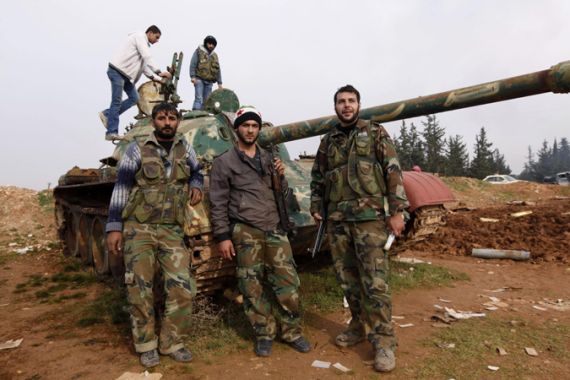‘No winner’ in Syrian conflict, says VP
Farouq al-Sharaa, the country’s vice-president, concedes that neither side can win the conflict, as violence continues.

Farouq al-Sharaa, the Syrian vice-president, has said that neither the government nor the rebels seeking the overthrow of President Bashar al-Assad can win the country’s 21-month conflict.
Sharaa has rarely been seen since the Syrian revolt erupted in March 2011 and is not part of the president’s inner circle directing the fight against the rebels.
He is, however, the most prominent figure to say in public that Assad will not be able to win the conflict.
Sharaa was speaking to the Lebanese al-Akhbar newspaper, in an interview published on Monday.
Assad’s forces have used jets and artillery to try to dislodge the fighters from around Damascus but the violence has crept close to the heart of the capital and rebels announced on Sunday a new offensive in the central province of Hama.
Sharaa said the situation in Syria, where more than 40,000 people have been killed, according to the opposition, was deteriorating and a “historic settlement” was needed to end the conflict, involving regional powers and the UN Security Council, and the formation of a national unity government “with broad powers”.
“With every passing day the political and military solutions are becoming more distant. We should be in a position defending the existence of Syria. We are not in a battle for an individual or a regime,” Sharaa was quoted as saying.
“The opposition cannot decisively settle the battle and what the security forces and army units are doing will not achieve a decisive settlement,” he told the paper, adding that the rebels fighting to topple Syria’s leadership could plunge it into “anarchy and an unending spiral of violence”.
The vice-president said that he “realise[d] that change is inevitable”, but that neither side was in a position to, on its own, say that it was representative of the Syrian people.
Yarmouk air raid
In Damascus, anti-government activists troops backed by tanks gathered outside Yarmouk camp, a residential area mainly housing Palestinian refugees but also Syrians displaced by recent violence, on Monday.
A day earlier, activists said fighter jets had bombed the district, killing at least eight people sheltering in a mosque.
UN chief Ban Ki-moon called the air attack “a matter of grave concern” and his spokesman said he was alarmed by the “dramatic escalation” of the conflict..
“The secretary-general is alarmed by the continued dramatic escalation of violence in Syria over the past several days, and the grave danger facing civilians in areas under fire,” said spokesman Martin Nesirky.
In response, Syria’s Foreign Minister Walid al-Muallem told Ban that Palestinians should not offer “shelter or assistance to terrorist groups” in Yarmouk, according to state television.
After the air raid in Yarmouk, clashes flared between Palestinians from the pro-Assad Popular Front for the Liberation of Palestine-General Command (PFLP-GC) and rebels, including other Palestinian fighters. Many residents fled the area on Monday to seek shelter in nearby neighbourhoods.
Turkish proposal
Meanwhile, a a Turkish newspaper reported on Monday that Turkey has made a new proposal to Russia for an orderly peaceful transition in Syria.
The proposal calls for Assad to step down in the first three months of 2013 and for the transition process to be undertaken by the opposition National Coalition, which was recognised as the sole representative of the Syrian people by Arab and Western states last week, the Radikal newspaper reported.
The plan was discussed during Russian President Vladimir Putin’s meeting with Turkish Prime Minister Recep Tayyip Erdogan in Istanbul on December 3 and Putin reportedly considered it a “creative formula,” according to Radikal.
Turkey, once a close trade ally of Damascus, has become a fierce critic of the regime.
For its part Russia has remained one of Assad’s few allies, routinely blocking resolutions against Syria at the UN Security Council.
Ankara, which has been tightlipped on the new proposal, is seeking to deprive Assad of Russian and Iranian support, according to Radikal.
The plan has been debated by the US, Egypt, Qatar, Russia and the UN over the past 10 days, the newspaper said.